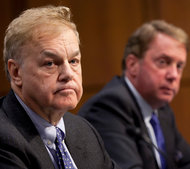 Andrew Harrer/Bloomberg NewsJames Giddens, left, trustee of the liquidation of MF Global, and Terrence Duffy, executive chairman of CME Group, at a Senate panel in Washington.
Andrew Harrer/Bloomberg NewsJames Giddens, left, trustee of the liquidation of MF Global, and Terrence Duffy, executive chairman of CME Group, at a Senate panel in Washington.
The trustee liquidating MF Global’s trading operations said on Friday that his office was seeking the return of more than $600 million from the failed firm’s British arm, potentially setting up a cross-border fight over customer money.
The trustee, James W. Giddens, said in a statement that he had identified about $600 million to $700 million in American customer money held at MF Global U.K. That money, he said, was held for clients who traded on foreign exchanges.
But KPMG, the court-appointed administrator for the British subsidiary, disputes that conclusion. In a news release last week, KPMG officials said they had recovered £594 million, or $931.1 million, of client money and £201 million, or $315.1 million, of company money. The administrator plans to begin returning money to British customers “as soon as reasonably practicable.”
“I am disappointed in the U.K. administrators’ position,” Mr. Giddens said in a statement. “While we have made significant progress in identifying and distributing customer property held by U.S. depositories, the U.K. administrators’ position will significantly affect, in the near term, my ability to return a substantial amount to U.S. customers dealing in foreign futures.”
But there are relatively few options for Mr. Giddens’ office to pursue. One of the most likely courses of action is to file a claim in the British court proceedings, in which the probability of success is uncertain but likely low. Many clients of Lehman Brothers whose positions were held at the collapsed investment bank’s British arm sought for months to try to unfreeze their money, but were forced to liquidate their positions.
The dispute highlights the growing difficulty that Mr. Giddens faces. His team has distributed most of the money held in U.S. depositary institutions, returning about 72 percent of customer money. But there is still $1.2 billion in customer money that hasn’t been accounted for.
(The money at the center of the tiff between Mr. Giddens and KPMG isn’t considered to be part of that pool of missing cash, instead belonging to a separate pot of customer money.)
Article source: http://feeds.nytimes.com/click.phdo?i=5f8f2bbd4887c72e8ed7bbf36fe5b1dc
Speak Your Mind
You must be logged in to post a comment.